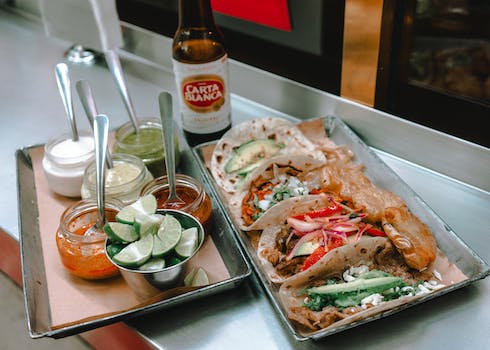-
Table of Contents
“Master the Tronc Scheme: Your Ultimate Guide to UK Food Business Success in 2024”
Introduction
Introduction:
A Comprehensive Guide to Tronc Scheme Rules for UK Food Businesses in 2024 provides essential information and guidance for food businesses operating in the United Kingdom. The Tronc scheme, also known as a tronc system, is a method used by businesses to distribute tips and service charges among their employees. This guide aims to outline the rules and regulations surrounding the Tronc scheme specifically for food businesses in the year 2024. By understanding and adhering to these rules, food businesses can ensure fair and transparent distribution of tips, fostering a positive work environment and customer satisfaction.
Understanding the Tronc Scheme: A Guide for UK Food Businesses in 2024
A Comprehensive Guide to Tronc Scheme Rules for UK Food Businesses in 2024
The Tronc scheme is an important aspect of the UK food industry, particularly for businesses that rely on tips as a significant part of their employees’ income. Understanding the Tronc scheme is crucial for food businesses to ensure compliance with the law and to provide fair and transparent tipping practices.
In 2024, there are several key rules and regulations that UK food businesses need to be aware of when it comes to the Tronc scheme. These rules aim to protect both employees and employers, ensuring that tips are distributed fairly and that employees receive their fair share.
Firstly, it is important to understand what the Tronc scheme is. The Tronc scheme is a method of distributing tips and service charges among employees. It allows businesses to pool tips and distribute them in a fair and transparent manner. This can be done through a designated Tronc master, who is responsible for managing the distribution of tips.
One of the key rules for the Tronc scheme in 2024 is that all employees must be informed about the existence of the scheme and how it operates. This means that food businesses must provide clear and concise information to their employees about the Tronc scheme, including how tips are collected, distributed, and any deductions that may be made.
Another important rule is that tips must be distributed fairly among employees. This means that the Tronc master must ensure that tips are divided based on a fair and transparent system, such as hours worked or job role. It is important to avoid any form of discrimination or favoritism when distributing tips.
In addition to fair distribution, it is also crucial for food businesses to ensure that employees receive their fair share of tips. This means that any deductions made from tips, such as for administrative costs or breakages, must be reasonable and clearly communicated to employees. It is important to keep accurate records of any deductions made and to provide employees with regular statements detailing their tips and any deductions.
Furthermore, food businesses must also comply with tax regulations when it comes to the Tronc scheme. Tips are considered taxable income, and both employees and employers have certain tax obligations. Employers must ensure that they are deducting the correct amount of tax from employees’ tips and reporting this to HM Revenue and Customs (HMRC) accurately. Employees, on the other hand, must declare their tips as part of their taxable income.
Lastly, it is important for food businesses to regularly review and update their Tronc scheme to ensure compliance with any changes in legislation. The Tronc scheme rules may be subject to updates and amendments, and it is the responsibility of the business to stay informed and make any necessary adjustments.
In conclusion, understanding the Tronc scheme is essential for UK food businesses in 2024. By following the rules and regulations, businesses can ensure fair and transparent tipping practices, protect both employees and employers, and comply with tax obligations. It is important to provide clear information to employees, distribute tips fairly, make reasonable deductions, and stay up to date with any changes in legislation. By doing so, food businesses can create a positive working environment and maintain the trust and satisfaction of their employees.
Implementing Tronc Scheme Rules: Best Practices for UK Food Businesses in 2024

A Comprehensive Guide to Tronc Scheme Rules for UK Food Businesses in 2024
Implementing Tronc Scheme Rules: Best Practices for UK Food Businesses in 2024
The Tronc scheme is a method used by UK food businesses to distribute tips and service charges among their employees. It ensures that the staff members who directly contribute to the customer experience are fairly rewarded for their efforts. However, implementing Tronc scheme rules can be complex, and it is essential for food businesses to understand the best practices to ensure compliance and fairness.
First and foremost, it is crucial for food businesses to have a clear understanding of the Tronc scheme rules. The scheme is governed by legislation, and it is essential to familiarize oneself with the specific regulations that apply to the industry. This includes understanding the legal requirements for setting up a Tronc scheme, the rules for distributing tips and service charges, and the obligations of both employers and employees.
Once the rules are understood, the next step is to establish a fair and transparent Tronc scheme. This involves setting up a Tronc committee, which should include representatives from both management and staff. The committee’s role is to oversee the distribution of tips and service charges and ensure that it is done in a fair and equitable manner. It is important to involve employees in the decision-making process to promote transparency and avoid any perception of favoritism.
To ensure compliance with the Tronc scheme rules, food businesses should maintain accurate records of all tips and service charges received and distributed. This includes keeping track of the total amount collected, the breakdown of how it is distributed, and any deductions made for administrative costs. These records should be regularly audited to ensure accuracy and transparency.
Communication is key when implementing Tronc scheme rules. Food businesses should clearly communicate the existence of the scheme to both employees and customers. Employees should be informed about how the scheme works, their rights and entitlements, and how they can raise any concerns or disputes. Customers should be made aware of the service charge and tipping policy, ensuring that they understand how their contributions are being distributed.
Training and education are essential for both management and staff. Managers should receive training on the legal requirements and best practices for implementing Tronc scheme rules. This will enable them to effectively oversee the scheme and address any issues that may arise. Staff members should also be educated about their rights and responsibilities under the scheme, as well as the importance of accurate record-keeping and transparency.
Regular reviews and evaluations are necessary to ensure the ongoing effectiveness of the Tronc scheme. Food businesses should periodically assess the scheme’s performance, seeking feedback from both employees and customers. This will help identify any areas for improvement and ensure that the scheme continues to meet its objectives of fairness and transparency.
In conclusion, implementing Tronc scheme rules for UK food businesses in 2024 requires a comprehensive understanding of the regulations and best practices. By establishing a fair and transparent Tronc scheme, maintaining accurate records, communicating effectively, providing training and education, and conducting regular reviews, food businesses can ensure compliance and fairness in the distribution of tips and service charges.
Navigating Tronc Scheme Compliance: Key Considerations for UK Food Businesses in 2024
A Comprehensive Guide to Tronc Scheme Rules for UK Food Businesses in 2024
The Tronc scheme is an important aspect of the UK food industry, particularly for businesses that rely on tips as a significant part of their employees’ income. In 2024, there are several key considerations that food businesses need to be aware of in order to navigate Tronc scheme compliance effectively.
First and foremost, it is crucial to understand what the Tronc scheme is and how it operates. The scheme allows businesses to distribute tips and service charges to their employees through a separate entity known as a Tronc. This ensures that the distribution of tips is fair and transparent, and that employees receive their fair share.
One of the key considerations for food businesses in 2024 is the requirement for Tronc schemes to be registered with HM Revenue and Customs (HMRC). This registration process involves providing detailed information about the Tronc scheme, including its structure, rules, and the individuals involved in its administration. It is important to ensure that the Tronc scheme is registered in a timely manner to avoid any penalties or legal issues.
Another important consideration is the need for transparency in the distribution of tips. Under the Tronc scheme rules, businesses are required to provide employees with a breakdown of how tips and service charges are distributed. This includes information on the amounts received by each employee, any deductions made, and any fees or charges imposed by the Tronc. It is essential to maintain accurate records and provide this information to employees upon request.
In addition to transparency, fairness is a key principle of the Tronc scheme. Businesses must ensure that tips and service charges are distributed in a fair and equitable manner, taking into account factors such as hours worked, job role, and performance. It is important to have clear and consistent rules in place for the distribution of tips, and to regularly review and update these rules as necessary.
Furthermore, businesses must be aware of the tax implications of the Tronc scheme. Tips and service charges distributed through a Tronc are subject to income tax and National Insurance contributions. It is important to ensure that these taxes are correctly calculated and deducted from employees’ earnings, and that accurate records are maintained for reporting purposes.
Another consideration for food businesses in 2024 is the potential impact of Brexit on the Tronc scheme. As the UK has left the European Union, there may be changes to the regulations and requirements surrounding the scheme. It is important to stay informed about any updates or changes to ensure ongoing compliance.
Finally, it is crucial for food businesses to regularly review and assess their Tronc scheme compliance. This includes conducting internal audits to ensure that the scheme is being operated correctly and in accordance with the rules and regulations. It is also important to stay up to date with any changes or updates to the Tronc scheme rules and to seek professional advice if needed.
In conclusion, navigating Tronc scheme compliance is a key consideration for UK food businesses in 2024. Understanding the rules and requirements of the scheme, ensuring transparency and fairness in the distribution of tips, and staying informed about any changes or updates are all essential for maintaining compliance. By following these guidelines, food businesses can effectively navigate the Tronc scheme and ensure that their employees receive their fair share of tips and service charges.
Q&A
1. What is the purpose of the Tronc Scheme Rules for UK food businesses in 2024?
The purpose of the Tronc Scheme Rules is to provide guidelines and regulations for UK food businesses regarding the distribution of tips and service charges among employees.
2. What does the Tronc Scheme entail?
The Tronc Scheme is a system that allows food businesses to distribute tips and service charges to their employees in a fair and transparent manner, ensuring that they receive their rightful share.
3. Why is it important for UK food businesses to adhere to the Tronc Scheme Rules?
Adhering to the Tronc Scheme Rules is important for UK food businesses as it promotes fairness and transparency in the distribution of tips and service charges, ensuring that employees are properly compensated for their work.
Conclusion
In conclusion, the Tronc Scheme Rules for UK food businesses in 2024 provide a comprehensive guide for employers and employees regarding the distribution of tips and service charges. These rules aim to ensure transparency, fairness, and compliance with legal requirements in the hospitality industry. By following these guidelines, food businesses can effectively manage their tronc schemes and maintain a positive working environment for their staff.

